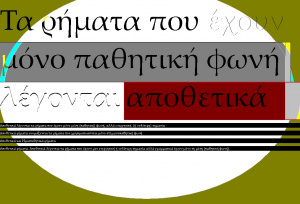Language/Modern-greek-1453/Grammar/Greek-Deponent-Verbs
Greek is an inflectional language with a rich and complex verb system. Among the many types of verbs in Greek, there are deponent verbs, which play a unique role. Deponent verbs are verbs that have passive or middle forms but active meanings. This article delves into the nature of Greek deponent verbs, their classification, formation, and usage.
What are Deponent Verbs?[edit | edit source]
Deponent verbs are a category of Greek verbs that, although they appear in the middle or passive voice, convey an active meaning. The term "deponent" comes from the Latin "deponere," which means "to lay aside" – in this case, the verbs have "laid aside" their active voice forms. Deponent verbs are found in both Ancient and Modern Greek.
Classification of Deponent Verbs[edit | edit source]
Deponent verbs in Greek can be classified into three main categories:
- Middle Deponents: These verbs have middle voice forms and active meanings. They are the most common type of deponent verb in Greek. Examples include "έρχομαι" (I come) and "ακολουθώ" (I follow).
- Passive Deponents: These verbs have passive voice forms but active meanings. Examples include "δέχομαι" (I accept) and "γεύομαι" (I taste).
- Middle-Passive Deponents: These verbs have both middle and passive voice forms but always carry active meanings. Examples include "αισθάνομαι" (I perceive) and "μαθαίνω" (I learn).
Formation of Deponent Verbs[edit | edit source]
Deponent verbs are formed by taking the stem of a regular verb and adding middle or passive voice endings. The endings differ depending on the tense and mood of the verb. For instance, in the present indicative, the middle voice endings are "-μαι," "-σαι," "-ται," "-μεθα," "-σθε," and "-νται." In the future indicative, the endings are "-σομαι," "-ση," "-σεται," "-σομεθα," "-σεσθε," and "-σονται."
Usage of Deponent Verbs[edit | edit source]
Since deponent verbs have passive or middle forms but active meanings, they function like active verbs in a sentence. This means that their subjects are the doers of the action, and they can take direct objects in the accusative case. Deponent verbs are used in various contexts, such as expressing actions, states, or emotions. They can be found in different tenses and moods, like the indicative, subjunctive, imperative, and participle forms.
Table: Greek Deponent Verbs with Examples[edit | edit source]
| Category | Verb (in Greek) | Verb (in English) | Example (in Greek) | Example (in English) |
|---|---|---|---|---|
| Middle Deponents | έρχομαι | I come | Ο Νίκος έρχεται σπίτι. | Nikos is coming to the house. |
| ακολουθώ | I follow | Η Μαρία ακολουθεί το δάσκαλο. | Maria is following the teacher. | |
| φοβάμαι | I fear | Φοβάμαι τα σκυλιά. | I am afraid of dogs. | |
| Passive Deponents | δέχομαι | I accept | Δεχόμαστε την πρότασή σου. | We accept your proposal. |
| γεύομαι | I taste | Ο Γιώργος γεύεται το γλυκό | George is tasting the sweet | |
| απολαμβάνω | I enjoy | Η Ελένη απολαμβάνει μουσική. | Eleni is enjoying the music. | |
| Middle-Passive | αισθάνομαι | I Feel | Αισθάνομαι πόνο στο στομάχι. | I feel a pain in my stomach. |
| Deponents | μαθαίνω | I learn | Τα παιδιά μαθαίνουν γράμματα. | The children are learning letters. |
This table provides a list of Greek deponent verbs, their English translations, and examples of usage in both Greek and English. The examples illustrate how these verbs function like active verbs in sentences, with their subjects acting as the doers of the action.
Conclusion[edit | edit source]
Greek deponent verbs is verbs lacking active forms. They conjugate only in the passive voice forms, having either active meaning or passive meaning.
Forms only in the passive voice, ending -μαι in the first person singular of the present tense.
Author[edit | edit source]
- Ευγενική χορηγία που στοχεύει να βοηθήσει μαθητές ή μη, απανταχού της Γης, που επιδίδονται στην εκμάθηση της ελληνικής γλώσσας!
- Contribution bénévole visant à aider les personnes, partout dans le monde, qui sont engagées dans l'apprentissage de la langue grecque !
- Voluntary contribution aimed at helping people, all over the world, who are committed to learning the Greek language!


